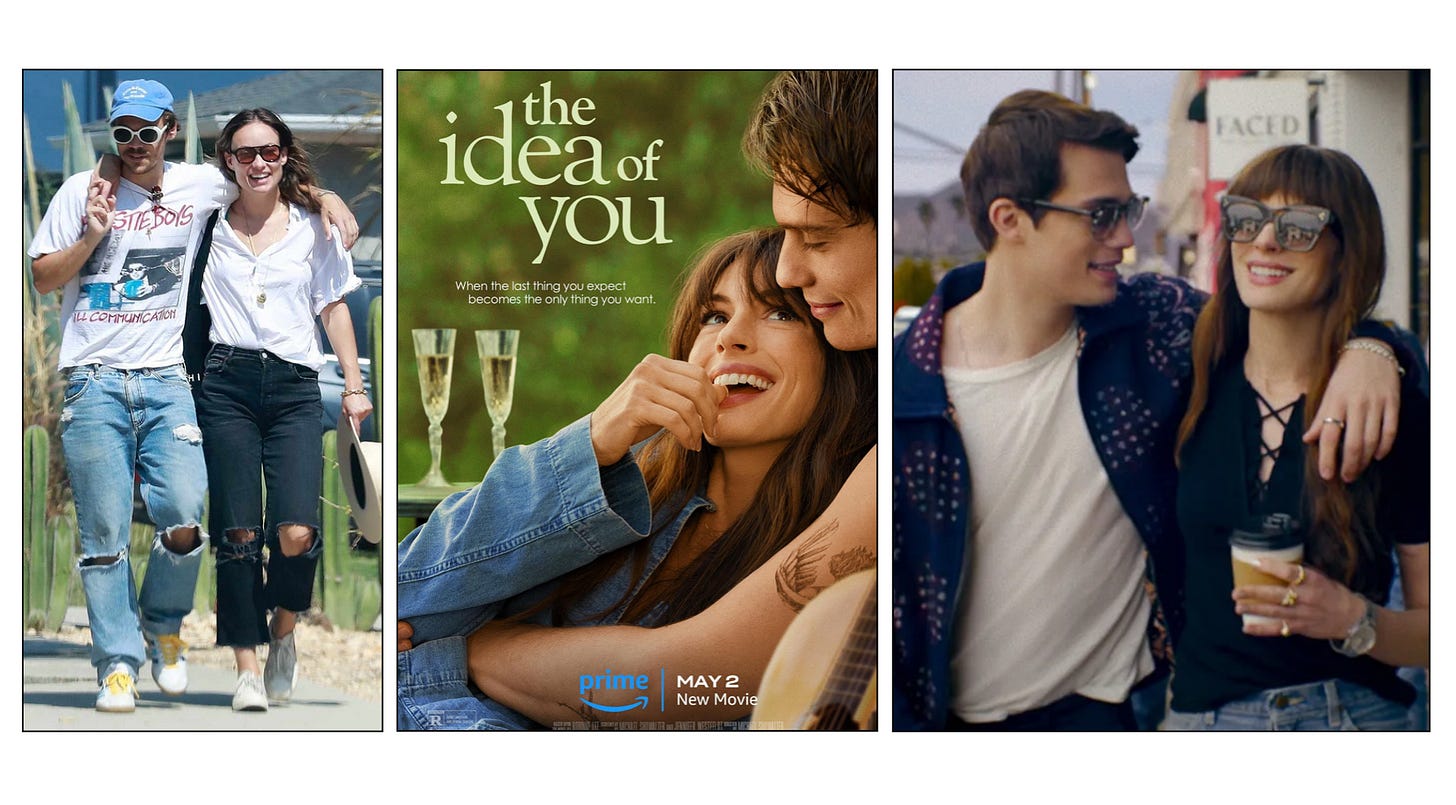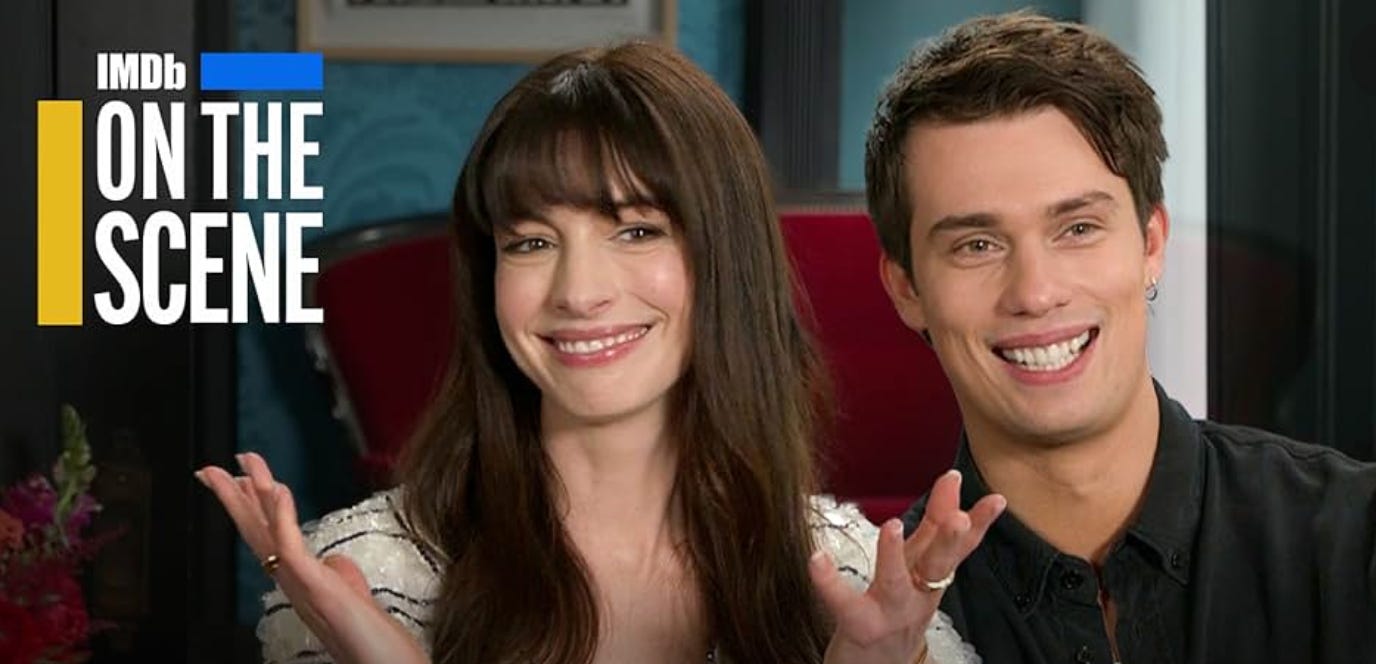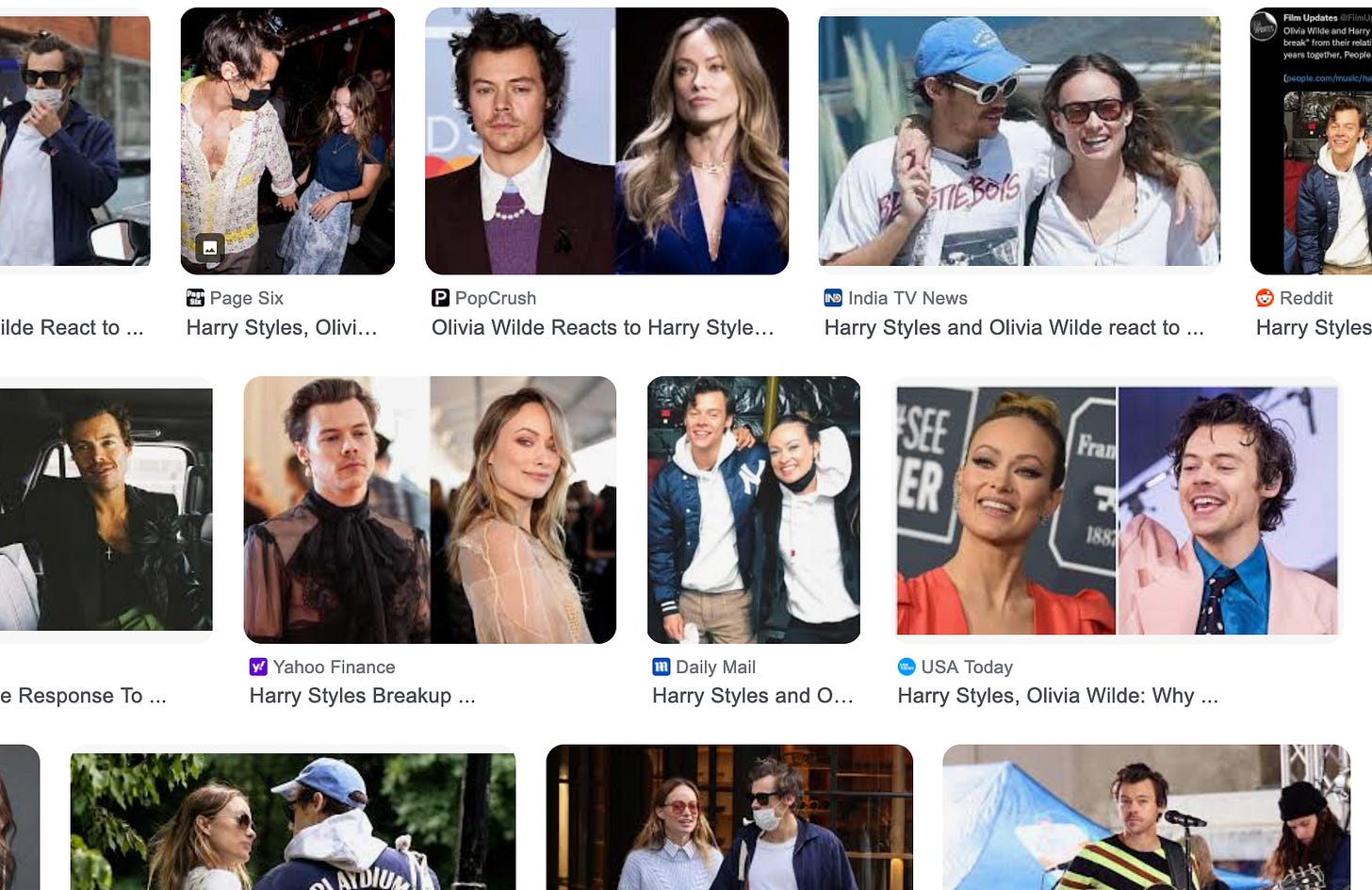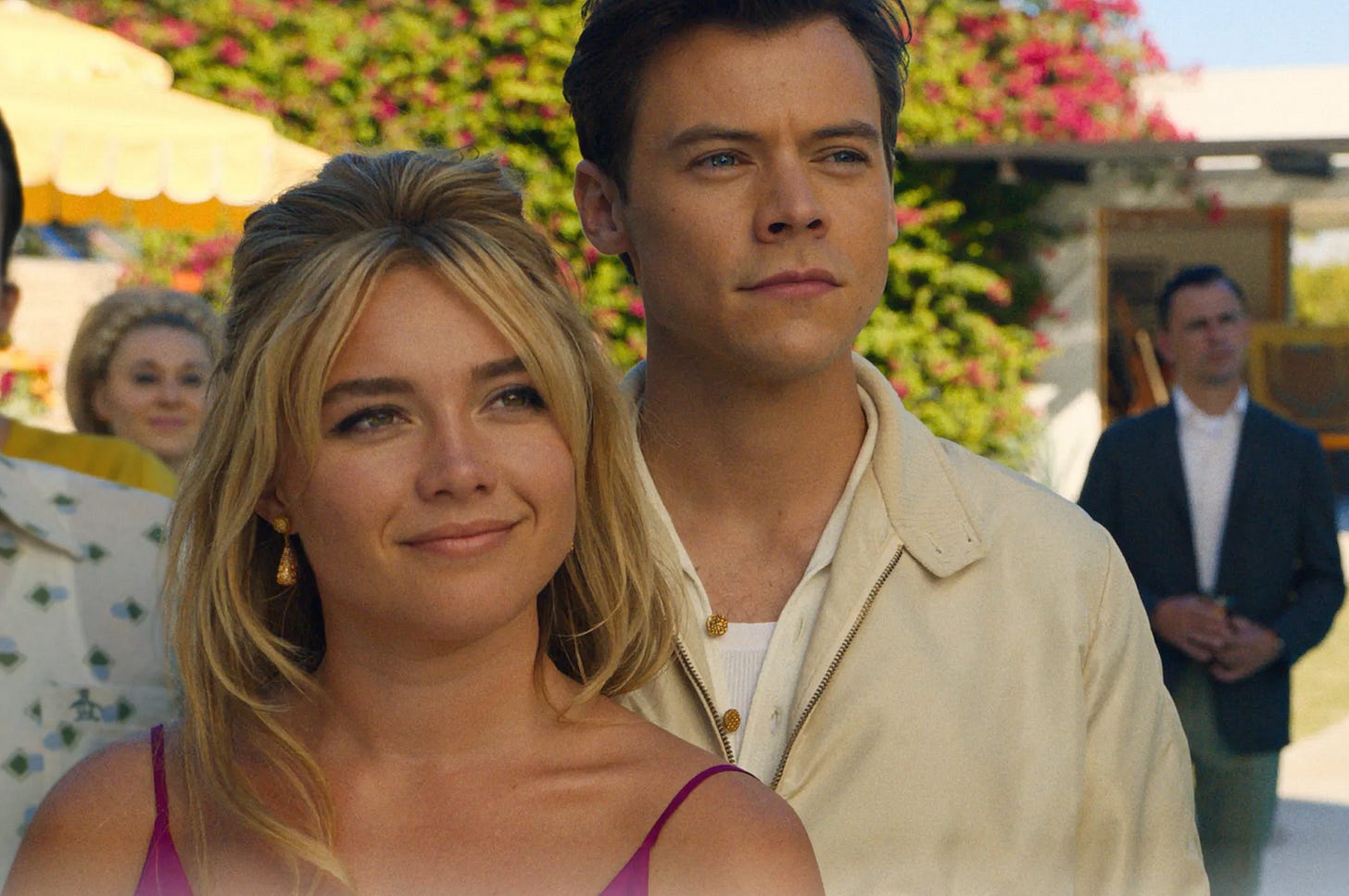Anne Hathaway's New Film is Delicious Propaganda
Less delightful: the Don't Worry Darling aftertaste it leaves in your mouth

Nobody wants to hear that their favourite film is propaganda for a colonial capitalist state
That’s why I don’t go to many parties. It’s too hard to make normal conversation.
Lucky for you, this is my party so grab a beverage and let’s unpack the subtle and obvious propaganda in Anne Hathaway’s new film, The Idea of You, and in Olivia Wilde’s 2022 film Don’t Worry Darling. Spoilers ahead.
Released on May 2nd through Amazon Prime1 and since becoming Amazon MGM’s biggest “rom-com” debut, The Idea of You is a 115 minute film about a 40 year old divorced mom who accidentally meets and falls in love with a 24 year old boy band member.
Anne, looking way too hot and put together to be a real human (apparently 40 is the new 25 and I am not mad about it), plays Solène, the owner of an art gallery in Silverlake (a district of Los Angeles) who recently split with her husband after discovering he’s been cheating on her with a younger woman.
It is revealed later in the film that everyone knew her husband was cheating, except for her. Obviously this becomes character motivation for why she won’t commit to—
Pop star Hayes Campbell, played by Nicholas Galitzine, an absolute dreamboat—tall, buff, and exuding charm with his soft eyes and British accent—who meets Solène after she accidentally hijacks his trailer while looking for a bathroom at Coachella.
Solène is at Coachella chaperoning her daughter’s VIP meet and greet of Hayes Campbell's boy band August Moon. Her ex husband bought their daughter and her friends the tickets, but bailed at the last minute leaving Solène to attend in his wake.
This is what Solène tells Hayes when they meet cute in Hayes’s trailer, that her daughter’s father got them the tickets.
“Your daughter’s father?” Hayes replies. “Not your husband?”
Solène affirms, yes, with a solid side of eye fucking, before members of Hayes’s team enter to help prep him for the concert and she slips away just as stealthily as she came.
During the concert, as Solène sways along in the audience, Hayes stops the show and asks his band mates to help him perform a special song—one about a woman who is a little bit older. Solène, delighted and intrigued, smiles up at him, considering, one can only assume, what it would be like to date someone whose poster once hung on her child’s wall (though, notably, was never her child’s chosen crush).
As we near the All is Lost moment later in the film, it is revealed that this stop-and-switch-the-song move is something all the band members do when a beautiful woman catches their eye...
But before Hayes and Solène break up, they have to commit—and the first act turning point comes when Hayes shows up at Solène’s gallery a few days after the concert, buying up all of the art in her store.
Naturally Solène invites Hayes to a second location after the buyout (to view more art at a warehouse in Glendale—shout out to Glendale), driving them past the paparazzi and any semblance of reality.
Just kidding.
We left reality the moment she managed to enter mainstage talent’s trailer from the meet and greet area. But every rom-com needs its meet cute and The Idea of You is no different.
More Nicholas Sparks lite than classic rom-com (I don’t remember laughing), the drama is present but stakes are low. The worst Solène has to endure is the internet’s wrath toward older women and her teenager daughter’s shame. While the worst Hayes has to face is living with band mates irritated that he no longer parties like he used to.
The film plays out as you would expect: mindless, horny entertainment. It’s well-crafted, serves its purpose to distract and delight, and pairs perfectly with dark chocolate, red wine, and over-eating takeout.
It’s the kind of dopamine-boosting story you put on after a long day when you just want to numb out and forget the world. Hence: Propaganda. Delicious propaganda.
Does one enjoy watching it? Of course. But at what cost?
I don’t know about you, but the single forty year old women I know are not dating rock stars. They are grieving the loss of not birthing children and putting “baby gay” in their dating profiles in the hopes of securing companionship—not because they’re super stoked on dating women but because they feel like they have no other choice than to give up on men.
Or they’re not looking for anyone at all. They’re reflecting upon the relationships they once believed would still be with them at forty and actively healing the regret.
Unlike Solène.
Solène would still be grieving her ex and his transgressions against her and their sworn marital union, but instead she has a globally adored 24 year old play thing to focus on. So relatable, right?
Sorry, “play thing” is harsh. Hayes Campbell is very mature for his age.
It’s a page straight out of the Twilight fan fiction algorithm: don’t give the people what they need, give them what they want. Namely—a horny, fantastical version of love where you can melt into the eyes of your lover until all of your problems go away.
In other words, what we’re all looking for.
Throughout the film, Hayes never sways from his gentle devotion to Solène. It’s her inability to trust, after being cheated on, that holds back the relationship. That and the fact that Hayes is a world famous youth whose fans find their connection offensive.
For anyone savvy to popular culture, The Idea of You feels plucked straight out of former One Direction boy band member Harry Styles’s relationship with filmmaker Olivia Wilde. The internet had a field day when Harry and Olivia got together on the set of Olivia’s film Don’t Worry Darling.
Married with kids to Jason Sudekis of SNL and Ted Lasso fame, the internet wrath’s against Olivia was two-fold. Not only was she ten years older than Harry, but also she left a coupling they deemed far more appropriate for her.
The Idea of You source material was released a few years before Harry and Olivia’s affair and the author of the book ensures us that Hayes’s character is based on multiple different people. Yet the comparison remains.
The movie ages up Hayes’s character, who in the book is 20, in order to make the narrative more palatable. They also age up Solène’s daughter from 12 to 16, giving more weight to both Solène and Hayes’s character arcs.
Having the daughter aged out of the boy band phase underlines Hayes’s biggest fear, that people will think he is a joke. He expresses this to Solène, telling her that he auditioned for the boy band at just 14 and that he feels like no one sees him for who he really is. This confirming my friend Sasha’s theory that while a woman’s greatest fear is being killed, a man’s greatest fear is being laughed at.
Solène validates Hayes, assuring him that he is not a joke. He, in turn, validates her and her attractiveness after the embarrassing end to her marriage. They use each other to assuage their pain. Like many people do in relationships, Solène and Hayes get lost in mutual pleasure, with no care for the outside world. Until the reality of fame bursts forth and threatens to pull them apart.
Ultimately they decide to end their relationship. Realizing that their coupling is bringing too much negative attention to Solène’s daughter, they decide to walk away. That is until…
Fives years later. The film, unlike the book, ends with a flash forward as happily single Solène, in her Hilma af Klint adorned office, hears a familiar commotion in the gallery. With a coy smile she realizes that someone is now all grown up—
—and viewers get the happily ever after they so desperately need want.
It’s kind of beautiful actually—the thought of someone coming back into your life after that long (also see: Ben Affleck and Jennifer Lopez2). I love this ending, even if we didn’t earn it. I love it almost as much as I love Anne Hathaway’s delightfully eclectic wardrobe, every moment of horniness, and the way Hayes looks at Solène as if she is perfect. That’s not the film’s obvious propaganda. (It may be subtle propaganda, but I’ll leave that up to you to decide.)
The film’s obvious propaganda is the fact that it takes place in a fantastical world where climate change, wealth inequality, and the destabilization of our global society don’t exist.
“If climate isn't in your story, it's science fiction.”
Dorothy Fortenberry
Writer & Producer, The Handmaid's Tale
At Good Energy Story, an initiative created to support TV and film creators in telling stories that honestly reflect the world we live in, they call stories without climate realities “science fiction.”
Personally, I think science fiction is a pretty polite way of saying “propaganda,” but the point remains—these stories are detached from reality and therefore a form of fantasy.
Propaganda suggests intent and while I can’t speak to the filmmakers’ intent (director Michael Showalter is known for Wet Hot American Summer and The Big Sick), I do know that Hollywood studios have a bottom line and generally all they care about is their return on investment.
When return on investment (ROI) is the top priority, we rarely get honest, raw stories about the truth of humanity. Instead we get science fiction disguised as romantic comedy, packed with whatever plot points will satisfy the hungry masses—because the only thing that matters about the content of the narrative is whether or not it will sell.
It’s the high fructose corn syrup method of storytelling. Come, get high off the sugar rush and when you crash, turn on the TV or scroll TikTok to find more.
We are pumped full of crap, at every angle, without ever realizing how much junk we are consuming. It plays out in the marketing of films too. Celebrity promotion feeds the media machine and creates buzz in the hopes of translating attention into dollars.
Many movies these days have marketing budgets so big they almost match the cost of making the film, becoming entirely reliant on big name stars to participate in the shill.
As Harry Styles and Olivia Wilde marketed their film, Don’t Worry Darling (directed by Wilde and written by Katie Silberman), the internet became so distracted by the antics of the big name stars, they forgot to consider the message of the film itself.
Wilde and Styles’s relationship took the forefront until fans noticed Florence Pugh—who starred in the film opposite Harry Styles—actively avoiding engaging with Wilde on social media as the film’s promotional marketing rolled out.
People began speculating (fueled by alleged whisperings from the set) that Pugh was upset at Wilde for behaving unprofessionally at work, the implication being that Wilde was distracted by her budding relationship with Styles and didn’t adequately fulfill her role as director.
Soon, Pugh was noticeably absent on the promotional tour, Spitgate (don’t ask) happened, and Don’t Worry Darling opened number one at the box office.
Wilde’s tactic for marketing the film (Don’t Worry Darling is her second feature after the universally acclaimed Booksmart) was to pitch it as “feminist” feature about “female pleasure.” In interview after interview, Wilde spoke to the depictions of female pleasure she’d crafted, proudly boasting that only women orgasm onscreen.
Some mark this as the real reason (or the reason on top of the lack of professionalism on set) that Pugh backed off her promotional responsibilities, a sentiment Pugh confirmed herself when she told Harper’s Bazaar, “When [the promotion is] reduced to your sex scenes, or to watch the most famous man in the world go down on someone, it’s not why we do it. It’s not why I’m in this industry.”
Though Pugh is clear in her lack of appreciation for the hyper-fixation on Styles’s tongue skills, she stops short of explaining the real problem the sex scenes pose.
If you watch Don’t Worry Darling until the end you’ll realize just how problematic and, frankly, horrifying it is to identify and celebrate the scenes of female pleasure in the film as indicative of any real pleasure or progress.
The film is set in a 50s-esque suburban desert where Stepford-reminiscent wives stay at home as their husbands go off to work at a mysterious facility. It’s a dreamy, weird world and as the film plays out, it is revealed that the women are not there by choice or consent.
We learn that the suburban desert is a virtual reality where incel-type men trap, imprison and enslave women in order to play out their fantasy of the modern traditional man and wife dynamic.
Man goes to work. Wife cooks and cleans. Man brings homes the bacon. Wife sets the table and does the dishes. Man goes down on wife. Wife wakes up in a dingy LA apartment, drugged and hooked up to wires, escaping particularly pleasurable round of cunnilingus.
It’s an interesting narrative to explore, one that Wilde clearly does not grasp. Though it’s hard to tell if she was confused about the message of the film from day one or if her relationship with Styles clouded her judgement along the way. People in love/lust have been known to do crazier things.
Harry Styles was not Wilde’s first choice for the role. Originally she cast Shia Labeouf—a less ROI-friendly selection, but more appropriate given the source material. Can you imagine the honest marketing? Member of famous boy band nabs first lead role as incel man who traps and enslaves woman, forcing her to play pretend with him!
While casting Styles was not a risk for the film’s ROI, due to his massive following, it was a risk for the narrative integrity of the film. For all Labeouf’s faults, the man has a proven track record of great acting. Styles, not so much. He had not been proven as a leading man, and most critics agreed the film suffered for it.
Casting Styles inevitably shifted the messaging around the film. No longer could the dystopic aspects of the film be highlighted (if they ever were intended to be in the first place), instead the focus became the coming—the female “pleasure”—a twisted praise of the power of the pussy.
Listen, if what incels want most is to eat pussy, they should say so. A woman will forgive you so many faults if you commit daily to making her come. Just look at our friend, Solène. You know Hayes was giving it to her nonstop. It’s not like he’s hard to look at, but we all know the real reason she joined him on his tour around Europe was to have that beautiful tongue on her body day and night.
Which is a great thing. We need more horniness in the world! We’re just not going to get there with depictions of rape marketed as feminism! I recognize I’m conflating the two films! Stay with me!
Ultimately Don’t Worry Darling wasn’t making a commentary on female pleasure. It was just showing a worst case scenario of incel culture. (If you are new to the term incel, it is short for “involuntary celibate” and is both a term of self-identification and a label used to mock a certain type of man.)
What makes the narrative insidious is Wilde choosing to market her film as feminist. But there is nothing feminist about a world where women have to kill men to escape.
Not only is it a boring story, it’s also offensive. While we can’t fault Olivia Wilde for coming of age during third wave feminism—the kind of feminism rooted in white fragility that externalizes blame and thwarts responsibility—we can admit that loving men and gaining true autonomy as a woman in a predominately patriarchal society is not a straightforward task, and we can choose to not make movies that celebrate killing men.
Sometimes audiences don’t have the first clue what a film is about (Jordan Peele’s NOPE comes to mind) and, at a certain point, it becomes embarrassing to tell them. But what’s even more embarrassing is when the filmmakers don’t know what the film they’re making is about, though it probably happens more often than we realize.
Stories are shift-y, shifting things. Stories exist in infinite context but each of us can only perceive them through our own unique perception. We can never see the full picture; we can only see what our awareness holds.
Stories can expand our awareness, limit our awareness, and reinforce our existing awareness. If we only watch stories to numb out—which is what’s happening with the rom-com crowd; they’re looking to be placated, soothed, and satisfied—we lose out on stories that could make us think, feel, or act differently.
The Idea of You is propaganda because it regulates our nervous systems to an oppressive system. Stressed about babies being bombed? Freaking out about the cost of food? Climate scaring you?! Housing insecure!?! Stop thinking about it!!! Turn your brain off. You deserve a treat.
It reassures us that everything is fine and that we, too, could have a soulful hottie loving us and proclaiming it for all the world to see.
Which is something we all deserve, no doubt. Except that life isn’t about deserving. Deserving is a lie propaganda taught you. LIFE is a board game you win by being the player with the most money at the end.
That’s how the system is rigged today.
Return on investment for just a few.
That’s the cost of a convenient narrative.
Women today are obviously hungry for romance. The third season of Bridgerton just debuted with a series best viewer count, streamers deliver half-baked rom-com features every month, and as recently as November, The Hallmark Channel secured a “rare” ratings win over Fox News, proving that romance lovers will settle for whatever they’re given.
It turns out that woman want to be held and adored and, yes, rescued. They want to be rescued from the pain of heartbreak and rejection, the way Hayes rescued Solène from 40. Woman want to feel valued and seen and they want to be looked at as if they are perfect.
We grew with this narrative of princes and princesses and true love and we want to keep believing in it. Despite the fact that the husband cheats and leaves, that the relationship was dead and we’re just now admitting it to ourselves. We yearn for the fantasy but we settle for the best we can get, which varies.
For us as the audience of The Idea of You, we had nothing to earn. Five years passes in 15 seconds with a transition and a title card. Neither Solène nor Hayes have to change or grow as characters.
You don’t have to call it propaganda, but you have to admit that it’s fantasy.
I believe that we shouldn’t make art right now unless it’s deeply in touch with reality. The doesn’t mean giving up on fantasy, but instead weaving fantasy that moves the global consciousness forward. That’s my opinion—that as empire crumbles and destabilization becomes the norm, stories that regulate us to fantastical depictions of capitalism working out great are not useful.
We need more stories depicting female pleasure, just not at the cost of our sensitivity. When we use story to numb out, we desensitize ourselves to reality and we accept less than we deserve. When we buy into the fantasy—the perfection and possibility of love without growth, without grief, without the hard work of self-actualization—we rob ourselves of the real beauty of intimacy in relationship. This is what’s really being sold to us: ease and an absence of pain.
If we are bypassing our pain, someone else is suffering for it. As one of the greatest romance comedies of all time tells us, Life is pain, Highness. Anyone who says differently is selling something.
Right now we are lemmings, jumping off any cliff we’re lead to, all because we yearn to feel the erotic, to be seen and held. This yearning is normal and natural and can, indeed, be fulfilled. But if that’s what we truly want—to be in union with romance, to be full and filled—maybe it’s time we stop accepting the quick, cheap highs.
When we decide to learn the difference between what we want and what we need, between what is real pleasure and what is a VR headset incel-induced fantasy, maybe then we can claim the romance that we are… not entitled to (because it is not about deserving), but that is legitimately possible, available, and most likely yearning for us too.
Love and the Multiverse is a multi-media newsletter that explores humanity, purpose, culture, and how stories shape the world. If you enjoyed this piece, you may also enjoy The Carrier Bag of Barbie and The Met Gala’s Hidden Metaphor.
I know what you’re thinking. If it’s on Amazon Prime, it must be evil. Not so. If you’re a Prime subscriber, check out Boots Riley’s series I’m A Virgo. It is hands down one of the most progressive pieces of television available today.
Lol, since I began writing this essay, it has been reported that these two are breaking up.







"It’s the high fructose corn syrup method of storytelling."
What a great line! May I steal it for a moment?
We are being bombarded with the high fructose corn syrup method everyday, genuine human connection is getting lost. Many points in your essay reminded me of the book "Dopamine Nation", which I highly recommend to my friends. (By that same logic, if I recommend that book to you, may we be friends? :P). The first quote from the book that came to mind was "The relentless pursuit of pleasure and avoidance of pain, leads to pain." This was brought up when I read another golden nugget of yours, "If we are bypassing our pain, someone else is suffering for it." This line sank deep into me.
Last year challenged me to confront my cobbled-up walls, held together by tape and twine. I learned what years of pain-bypassing has created, how it wounded those near and dear to me, and why it needed to change. It was the harsh and raw reality that instant gratification will inevitably come to collect. And the interest rate is high.
But on the other side of that journey, I've found myself. I've learned what I'm made of. I know I can do difficult things, that my ability to face pain and my resilience is stronger than I had ever imagined. I learned that I can accept what life sends my way and be in control of how I forge through it. That I can stay grounded and truly enjoy the simple things this world has to offer.
"I urge you to find a way to immerse yourself fully in the life that you’ve been given. To stop running from whatever you’re trying to escape, and instead to stop, and turn, and face whatever it is. Then I dare you to walk toward it. In this way, the world may reveal itself to you as something magical and awe-inspiring that does not require escape." ― Anna Lembke, Dopamine Nation
I hope this week's treating you kindly, Kelly. Your essay was such a lovely, thought-provoking read and I want you to know how much I appreciate your thoughts, heart, and candour.
You wouldn't guess how, but it was an absolute pleasure to have found your corner of the multiverse.
Thank you 🙏🏻